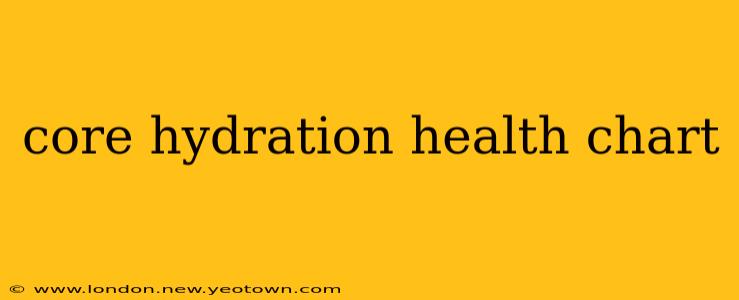Decoding Your Body's Hydration: A Journey Through the Core Hydration Health Chart
We've all heard the mantra: "Drink eight glasses of water a day!" But is that really the whole story? The truth is, optimal hydration isn't just about gulping down a certain number of glasses; it's a nuanced dance between individual needs, activity levels, climate, and even underlying health conditions. Let's dive deeper into understanding core hydration and how to interpret the often-misunderstood "hydration chart." There isn't one single, universally accepted chart, but rather a set of guidelines and indicators to help you assess your hydration status.
This journey begins not with a chart, but with an understanding of your body's signals. Think of your body as a sophisticated machine, constantly communicating its needs. Ignoring these signals can lead to dehydration, which, while often mild, can have serious consequences over time.
What are the Signs of Dehydration?
This is a crucial first step before even considering a hydration chart. Recognizing the subtle (and not-so-subtle) signs of dehydration is your personal early warning system. These can include:
- Extreme thirst: This is your body screaming for water! Don't ignore it.
- Dry mouth and lips: A classic sign, easily checked.
- Headache: Dehydration can trigger headaches, sometimes intense.
- Fatigue and dizziness: Your body needs water to function optimally.
- Dark urine: The color of your urine is a powerful indicator. Pale yellow is good; dark yellow or amber suggests dehydration.
- Muscle cramps: Dehydration can disrupt electrolyte balance, leading to cramps.
- Constipation: Water helps with proper bowel movements.
How Can I Tell If I'm Properly Hydrated?
The "chart" you're looking for is actually a combination of observation and awareness. While there isn't a single definitive chart, we can look at several key indicators:
- Urine color: As mentioned, pale yellow urine is a great sign of adequate hydration.
- Energy levels: Sustained energy throughout the day is a good indication of proper hydration.
- Skin elasticity: Pinch the skin on your hand; if it springs back quickly, you're likely well-hydrated. Slow return indicates possible dehydration.
- Regular bowel movements: Proper hydration supports healthy digestion.
What Factors Influence My Hydration Needs?
Several factors beyond the basic "eight glasses" guideline dramatically affect your individual hydration needs. These include:
- Climate: Hot and humid climates require significantly more water intake.
- Activity level: Exercise significantly increases fluid loss through sweat.
- Diet: Fruits and vegetables contribute to overall hydration.
- Health conditions: Certain medical conditions can impact hydration needs.
- Medication: Some medications can increase fluid loss.
What is the Best Way to Stay Hydrated?
It's not just about the quantity; it's about the quality and consistency of your hydration strategy. Here are some practical tips:
- Drink water throughout the day: Don't wait until you're thirsty.
- Carry a reusable water bottle: This makes it convenient to stay hydrated on the go.
- Eat hydrating foods: Fruits and vegetables contribute significantly to your daily fluid intake.
- Listen to your body: Pay attention to your thirst cues and other signs of dehydration.
- Adjust your intake based on activity and climate: Increase water intake during intense workouts or hot weather.
How Much Water Should I Drink Each Day?
This is often the million-dollar question, and unfortunately, there's no single perfect answer. General guidelines suggest around 2-3 liters of fluid daily for adults, but this can vary greatly depending on the factors discussed above. Focus on paying attention to your body's signals, rather than rigidly adhering to a specific number.
In conclusion, while a simple "core hydration health chart" might not exist in a neat, tabular format, understanding your body’s signals and adjusting your fluid intake based on individual factors is crucial for optimal health and well-being. It's a journey of self-awareness and mindful hydration, not a rigid formula. Remember, this is a conversation between you and your body—listen carefully, and you'll find the perfect hydration balance.

